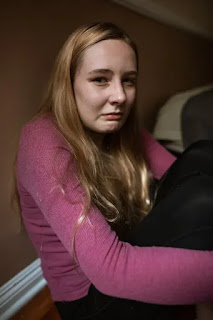“I was talking to my friend Cindy last night,” Jenny begins. “She said she came across this quote from Eleanor Roosevelt ‘Do something every day that scares you.’ I was blown away. That’s just what we’ve been talking about, right?”
“Yes,” I agree nodding. “That’s a very profound quote.”
“But I thought you said you have to feel safe in order to take risks.”
“That’s also true. But if you wait until your last, last drop of fear and anxiety is gone you might stay stuck forever.”
“I know,” Jenny says dejectedly. “That’s why I’m here,”
“You’re 25 years old Jenny, I don’t think you can say you’re stuck forever.”
“I know. But we’ve been working for a while now and there are still so many things I’m terribly, terribly afraid of. Meeting new people is a total, complete trauma for me. I hate the first few weeks of school. There are so many new people, new faces, new expectations, new, new, new.”
“And what is it that you’d say you’re afraid of?”
“That’s no secret. The wicked step-mother! What a cliché.”
“Except your step-mother was a little more wicked than most.”
Jenny seems to fade away and soon starts visibly shaking.
“Jenny, where are you? Can you come back?”
“I’m here. I didn’t dissociate. At least I don’t think I did. I knew I was here with you in your office.” Pause. “But perhaps part of me was back there, back in that basement,” she says starting to cry. “Why, why did she hate me so much? What did I do that was so terrible?”
“Jenny…”
“I know. You’re going to say I didn’t do anything. That she hated me because I took my Dad away from her, because she couldn’t have him every minute of his life. But maybe that means I was too demanding, wanted too much!” she adds sobbing.
“Is that how it feels, how it felt?”
“Yes, that I was just a greedy child who would suck her father dry unless Darlene stepped in to protect him! After all, I had killed my mother, why wouldn’t I kill him?!”
“Do you feel you killed your mother?”
“Of course!” Pause. “No, no I didn’t kill my mother, she died of cancer!”
“Jenny, it sounds like the rational you knows that you didn’t kill your mother, but perhaps there is a piece of you that feels you did.”“She died so soon after I was born, before I was one. I don’t remember her at all,” she says sobbing. “Is that killing her? Not remembering her?” Pause. “Maybe I infected her when I was inside her. Maybe there was something so bad about me I contaminated her.”
Although the rational me, yearns to counter Jenny’s assessment of her culpability, I wait to see what more primitive material Jenny may unearth.
“Darlene would always tell me I was a bad seed, destined to do nothing but hurt and destroy. I fought her, screaming, yelling, thrashing, but she only hurt me more, left me starving in the freezing cold basement. It gets cold in Vermont in the winter. But, truthfully, I believed her. I believed I was a bad, bad person. I had killed my mother. She gave up her life for me. Even neighbors said that. ‘Your mother loved you so much. She gave up her life for you.’ She gave up her life for me and I was so, so angry with her. If she was going to have me, she should have stayed with me!! If she was going to leave me she should never have had me!” Jenny says, sobbing.
I want to go her and hold her and tell her nothing was her fault and that everything will be all right. Instead, I sit calmly in my chair.
“I never said that out loud before,” Jenny says between sobs. “It feels good to say it out loud.”
“What feels good about saying it out loud?”
“I’m not sure. Sort of like I can examine it in the light of day.”
“And what do you see when you examine it in the light of day, in the light of an adult day?”
“Yes, that’s it. Saying it out loud brought it into the present, into me as an adult – sort of. It’s like a child fantasy that I’ve carried around my whole life and in the light of day – in the adult light – it doesn’t feel as real or as powerful.”
Yes, yes I am,” she says smiling for the first time. “Thank you.”
“Thank you,” I say.






